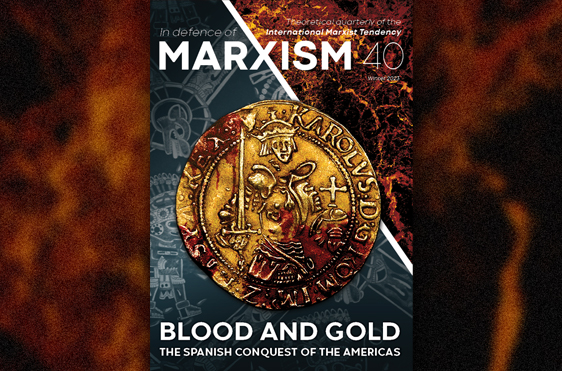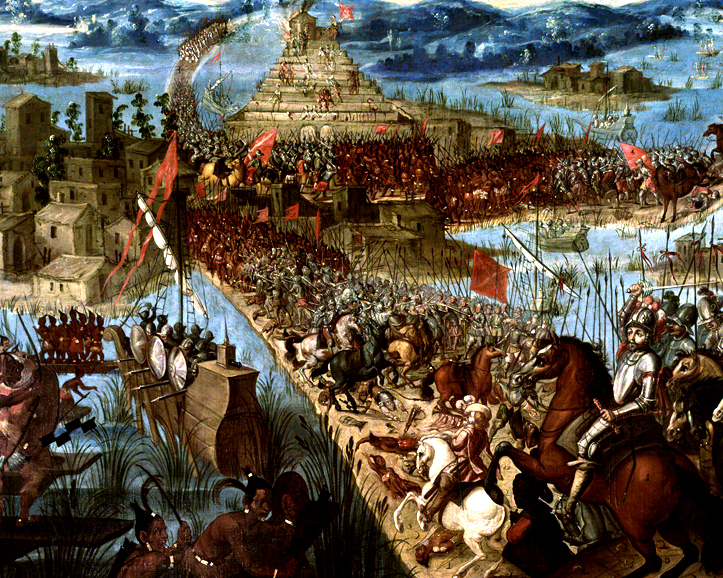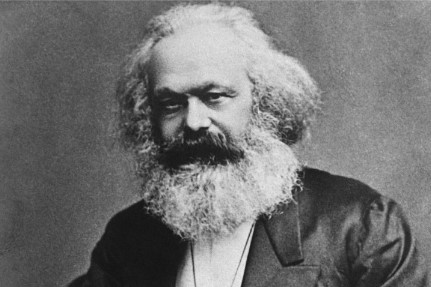
The International Marxist Tendency is proud to present the Winter 2023 edition of the In Defence of Marxism theoretical journal. The feature article in this issue takes on the Spanish Conquest of the Americas, which far from a ‘meeting of cultures’, was a brutal and bloody affair resulting in the extermination of millions of indigenous peoples. We publish the editorial by editor-in-chief Alan Woods below.
Subscribe to In Defence of Marxism here!
Editorial
The present issue is composed of a number of articles dealing with a very interesting subject: the decline of feudalism and the early phase of capitalist development, which Marx described as the primitive accumulation of capital.
Marx wrote in Capital that “If money comes into the world with a congenital blood-stain on one cheek, then capital comes dripping from head to toe, from every pore, with blood and dirt.” Nowhere is this statement more relevant than in the bloody history of the rape of America by a host of European nations, most notably the English in the North and the Spanish in the South.
The conquest of the Americas by Spain is one of the most appalling episodes in the blood-drenched annals of human history. In analysing it, Jorge Martín and Ubaldo Oropeza deal in some depth with another fascinating question: the character of American societies before the Spanish conquest, the reasons behind their collapse and the ensuing conquest as well as the role of the conquest in the development of capitalism.
A second article, which is separate but related, is one I wrote some time ago on the great Spanish writer Cervantes, the author of Don Quixote, which describes Spanish society in the same period. Following the same theme, Pascal Cueto writes about the 1780 uprising of Túpac Amaru II against Spanish rule.
Finally, we republish an important but unfinished and little known article by Engels on the decline of feudalism and the rise of the bourgeoisie, which deserves a far wider audience.
The destruction of the Americas
“Smoke rises, the mist is spreading.
Weep, my friends and know that by their deeds
We have lost our history.”
Lines written by an unknown Aztec poet.
When the Spaniards first came to Mexico, the country was home to a flourishing state with a population of 22 million. 80 years later its culture was destroyed, its economy in ruins and its people enslaved. 90 percent of the population had lost their lives, either massacred by the Spaniards and their allies, or from hunger or diseases that decimated whole communities.
This was genocide on a horrendous scale. The Spaniards rampaged through the country, burning, butchering and enslaving. Carrying the banner of the Christian Cross before them, they systematically slaughtered the men, and branded the women and children on the face and sold them as slaves.
The last Aztec chief, Cuauhtémoc, was tortured with fire to reveal where the gold was, and then hanged when the Spaniards did not find the quantities of gold they had expected. The vast and thriving lake-city of Tenochtitlan was burned, plundered and destroyed.
Spiritual genocide
The destructive activities of the Spaniards reduced a once proud people to an abject condition of servitude and despair. Their physical slavery was accompanied by demoralisation, disease, depression and alcoholism. But the genocide of the native Americans did not stop at physical extermination. It also involved an attempt to destroy their art, religion and culture.

After the conquistadors had enslaved the Aztecs with fire and sword, the hordes of fanatical priests descended upon them like hungry locusts, greedy for captive souls. In order to eradicate all traces of the native culture, they built Christian churches over the remains of their pyramids and cult centres. Priceless works of art were melted down into gold ingots or recast into huge Christian relics of little or no aesthetic value.
A long time ago I visited an old church in Cádiz (I think it was) where a number of Christian relics were on display – large casks and the like – mostly dating to the period of the conquest of the Americas. These items may have served to impress people, if only by the huge quantities of gold and silver employed in their production.
But I must confess that I found these pompous relics of superstition completely tasteless from an artistic point of view and was disgusted at the thought of the many valuable works of art that were destroyed in their making. Even more revolting was the thought of those millions of men, women and children whose lives were sacrificed on the monstrous altar of Capital, disguised in the robes of a Catholic priest.
But the Spaniards did not have a monopoly of violence and cruelty in those dark times. The period of primitive accumulation of capital is full of the most terrible stories of exploitation, vile oppression, slavery and mass murder perpetrated by ‘civilised’ Europeans of different nations.
From the brutal expropriation of the Scottish and Irish peasantry, to the deliberate killing of Native Americans presented by European settlers with blankets infected with smallpox, to the monstrous slave trade in Africa, which kept the plantations in the Caribbean supplied with cheap labour and the merchants of Liverpool and Bristol in a life of idle luxury. There seems to have been no end to it.
Can history be judged by morality?
Edward Gibbon in his masterpiece, The History of the Decline and Fall of the Roman Empire, wrote that history is “indeed, little more than the register of the crimes, follies, and misfortunes of mankind.” Gibbon was a wonderful writer, a true man of the Enlightenment. But his interpretation of history is one-sided and profoundly mistaken.
Our postmodernists have none of his virtues and have not advanced a single step beyond his analysis when they allege that there is no such thing as progress, that one society is as good or bad as another and history has no meaning.
Essentially, their reading of history (insofar as it exists at all) is reduced to sentimental moralising. That certainly has no meaning, or at any rate, is unable to tell us anything meaningful about history, which remains for them a book sealed with seven seals.
Reading the blood-soaked annals of this period one is filled with a profound sense of indignation and revulsion, yet morality and feelings of repugnance are of as little value in understanding human history as they would be to a surgeon who strives to save the life of the patient under his scalpel.
The motor forces of history never had even the smallest moral or ethical content. On the contrary, the morality and ethics of every period are ultimately derived from an attempt to justify the existing property relations that are sanctified by its laws.
History cannot be reduced to morality, religion, politics or philosophy. These are more or less distorted reflections in men’s minds of real social relations. They merely constitute the illusions of the prevailing epoch. The real conditions of social (and therefore human) development have a material content, not an ideal, still less an ethical one.
“Money does not stink”
When the Roman emperor Vespasian (who ruled in 69–79 CE) was rebuked by his fastidious son Titus for introducing a tax on the collection of urine, he is supposed to have replied pecunia non olet, which means “money does not stink”. The intention was to show that money is not tainted regardless of its origins.

This idea is so attractive to the bankers and capitalists that they have elevated it to a principle that has endured for centuries and is still maintained in our own times, when the viciously oppressive and exploitative system of market economics is carefully disguised under a thick coat of moral hypocrisy.
In the final analysis, however, the progress of society can only be measured by the development of the productive forces. That is the real foundation upon which all other elements of what is called ‘civilisation’, all intellectual, scientific, philosophical and artistic life can flourish and develop.
As Marx says in The German Ideology: “the sum of productive forces, capital funds and social forms of interaction”, are the conditions of life itself.
The gold that was extracted from the slaves in the gold mines of what was known as the New World, did not save imperial Spain. It helped destroy it from within its bowels. Spain was displaced by England, the mightiest maritime power, which within the space of a century, enjoyed practically a monopoly of commerce and manufacture.
The wealth created out of the blood, sweat and tears of generations of slaves and workers alike entered as a component part of Capital. This was used to fuel one of the greatest revolutions in human history: the Industrial Revolution. And out of that fiery furnace came the modern proletariat – the class that is destined to expropriate the expropriators.
The material basis of socialism
Lenin pointed out that socialism will be built “out of the material that capitalism left us”, because “we have no other bricks with which to build.” Karl Marx explains that socialism presupposes a level of development where capitalism has become the dominant mode of production on a world scale.
We are now living in the epoch of imperialism, where large-scale industry, finance capital, and monopolies have established a dominant role, and the narrowness of the nation state is challenged by the rise of a global economy.
Today we may weep for the fate of the Maya, Aztecs and Incas. Their contribution to the sum total of human culture and civilisation is immortal and, despite the vandalism of the conquistadors, will never be forgotten. But merely to see the past, like Edward Gibbon, as an endless list of crimes and injustice is too one-sided and misses the essential point.
The real meaning of history is precisely that the development of the productive forces, which was achieved by centuries of the most appalling oppression and exploitation of the masses, has created the necessary material conditions for the establishment of a higher form of human society – world socialism.
Humanity cannot live on dreams of a return to a past that is gone forever. In our vocabulary there is no room for the word sentimentality. A man or woman who has become an adult can never return to a lost childhood. In the same way, those who present a vision of past societies in an idealised light may justly be regarded as childish. Those who dream of putting the clock back, of returning to an imaginary past, when all was sweetness and light, can only play a reactionary role.
Not by dreams of returning to a non-existent past, but only by fighting for a new and better future can humanity ever hope to rise to its full stature. It is the historic task of the working class to put an end to all exploitation, oppression and injustice, and strike a blow that will finally bring about the long yearned-for revenge for all the pain, bloodshed and suffering that has been inflicted on humanity for so many centuries.
London, 23 November 2022

